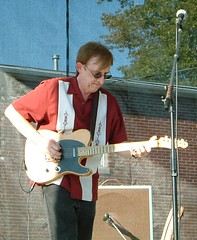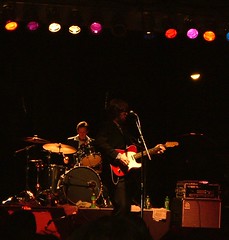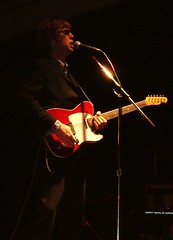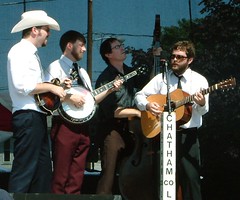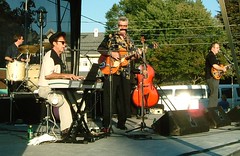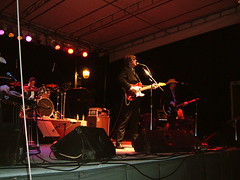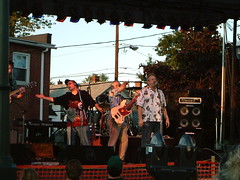Friday, December 23, 2005
Howard Stern in the Land of No Bleep
Will an unbridled Stern simply amp up the frat-boy antics, or will something else emerge?
Stern is at his best when he asks squirm-inducing questions of his guests -- lampooning pompous celebrities; allowing starlets, strippers and rock stars to demonstrate their intellectual prowess; and providing a platform for racists, fascists and their ilk to bury themselves in uproarious ugliness.
But the occasional moments of genuine hilarity are too often separated by yet another segment of seventh-grade-level obsession with genitalia and/or the digestive process. Stern talking a woman out of her blouse is just not as funny as Stern asking Tori Spelling to name the capitol of New York State (her answer: New Jersey).
So what happens to Stern when there is no need for a 7-second delay, and no threat of whopper FCC fines? Is there any real mystery about what gets bleeped? And if not, is the ability to hear anyone on the Stern show utter even the filthiest expletive enough to keep a satellite audience entertained, especially when listeners can hear all the nasty language they want on any of dozens of other Sirius channels? In the uncensored world of satellite radio, dirty talk is not a distinguishing feature.
Stern's move to Sirius is a milestone in the continuing tectonic shift in media consumption. But the self-described king of all media is likely to find that he will need more than the Seven Dirty Words to keep his crown from slipping.
(Also available on Blogcritics.com)
Sunday, November 13, 2005
Folk School: Carrying on the Tradition at the Kent State Folk Festival
During the free workshops at the 39th annual Kent State Folk Festival, Nov. 19, 12 p.m. - 5 p.m., variations on that scene will play out in classrooms in the Student Center and in the adjacent Kiva auditorium, as some the region's best performers demonstrate and discuss instrumental technique (mandolin, fiddle, guitar, banjo, accordion), musical styles (bluegrass, blues, swing, Celtic, Balkan), songwriting, storytelling, and clog and contra dancing.
Elsewhere in the Student Center -- in designated jam rooms, lobby corners, and sometimes even outside -- amateur and professional players of all ages gather in floating sessions that will last the entire afternoon, playing everything from ancient jazz and pop tunes to blues and bluegrass, and the occasional classical piece.
While the dominant feature of the festival is the series of concerts by an eclectic list of national and regional artists, the workshops, held on the final day of the festival, represent the accessibility and personal interaction that define the folk music tradition.
"People want to know what's going on," said Josh Davis, singer and guitarist with Steppin' In It, one of the national recording acts that participated in the 2004 festival workshops, and a prime example of the new generation of folk performers.
"That's the cool thing about this music. People have a lot of hands-on interest, whereas with a lot of other kinds of music, people may have hands-on interest but it's not made very accessible," Davis said. "I've met most of my heroes in the folk music world, but there's no way I'm going to meet anybody from the pop music world."
It was at a KSU folk festival workshop that Roland Kausen, a veteran featured mandolin and bluegrass workshop performer, met and played with one of his heroes: bluegrass legend Jethro Burns.
"He was just such an easy-going guy, always cracking jokes, and he was really supportive of all the musicians around him. There was not a lot of ego there. It was a joy, and it was actually inspiring," Kausen said.
While the folk fans and amateur players are drawn to the workshops for the opportunity to listen to and learn from the some of the region's most skilled players, the featured workshop performers are attracted by the back-porch, community atmosphere.
"We all know each other and we've been doing this for twenty or thirty years," Kausen said. "It's an opportunity to get back together and visit and play."
That opportunity is rare among the area's working musicians.
"We don't get a chance to hear each other play because we're working," said Seth Rosen, a member of Cleveland-based roots band The Suspenders and another veteran swing and mandolin workshop performer. "This kind of thing during the day is an opportunity to hang out."
The Kent Folk Festival workshops are "one of the friendliest events you're going to find," according to Al Moss, pedal steel guitar player with Hillbilly Idol and a featured performer in the steel guitar workshop at the 2004 festival.
"As many times as I've been a part of it, in workshops or just participating in the audience, man, it's just like old home week," Moss said.
But for Moss and other featured workshop performers, the workshops also represent an opportunity to evangelize about the music.
Moss described the steel guitar workshop at the 2004 festival as an opportunity to be a "missionary of the pedal steel" to those who are unfamiliar with the instrument. "Lot's of folks, especially when you get north of the Mason-Dixon line, look at what I play and call it a keyboard. Or they hear it and say, 'Oh, yeah, I recognize that sound, but I didn't know that's what it looked like.'"
"What I hope is that they walk away with a better understanding," Moss said, "and then they will get turned on and want to play one."
If the number of guitar, fiddle, mandolin and other instruments cases being toted by those attending the workshops is any indication, people of all ages are getting turned on, and, thanks to events like these workshops, the folk music tradition shows no signs of running out of steam.
The Kent State Folk Festival workshops are free and open to the public. For more information and a complete schedule visit: kentstatefolkfestival.org
(Also available on Blogcritics.org.)
Tuesday, October 25, 2005
The 39th Annual Kent State Folk Festival: Workshops
A day of free entertainment. More on this later.
Saturday, October 22, 2005
Profile: Folk Alley's Jim Blum
These days he is busy with preparations for the 39th annual Kent State Folk Festival, Nov. 11-19. Headliners for the the 2005 series of concerts include John Gorka, the Holmes Brothers, Over the Rhine and 60s icon Donovan.
Blum got his start as the host of an hour-long bluegrass show on WKSU. The Kent graduate had no radio experience, but had played in a bluegrass and swing band, and had worked as an actor and voice-over announcer.
"I submitted a tape and it came down between me and a professor and they thought, 'let's give it to this young guy, he may stick around a lot longer,'" Blum said.
They were right.
He split his time between his radio job, work as a salesman for a construction company, and acting in industrial films for General Electric and Sherwin Williams. It was a tough time, and then it got tougher. The market for the industrial films dried up in the sour economy of the late 90s, as did Blum's marriage.
He was hosting two evening folk shows on WSKU and spending one day in the office. The station management wanted to add a third night of folk programming, but was having difficulty finding someone to host the extra show. At the urging of station colleagues, Blum approached management with the idea of taking on the new night and rounding out a full-time schedule with work organizing the folk festival and other concerts.
The station agreed, and in 1997 Blum became a full-time folk radio host and music programmer.
In September 2003 those roles spilled over into Folk Alley, when WKSU launched the Web site to reach a world-wide audience with a 24/7 digital stream of folk music. Folk Alley now has more than 50,000 registered users, and countless others who listen via iTunes.
What goes into selecting the music for Folk Alley and WKSU? "People say it's all subjective, that it's whatever you like," Blum said. "Oh, no it ain't."
"I can point to any song on Folk Alley and tell you why it's there."
Blum describes a complex criteria for song selection that includes melodic structure, lyrical content, instrumental virtuosity and an absence of clichés. In programming the songs for each show, Blum likes a diverse mix of male and female performers, solo acts and groups and songs in a variety of tempos.
Blaring electric guitar solos or jazzy horn sections are unlikely to make the cut. The selected music is generally acoustic, but each piece is considered on its own merit, according to Blum.
"There are things that might not be totally acoustic, but they fit, " Blum explained.
The boundaries of folk music are unclear, and that is what makes the music unique. Blum draws from several categories: singer-songwriters; heroes, such as Pete Seeger, Lead Belly, and Joni Mitchell; instrumentalists, such as fiddle and guitar whiz Mark O'Connor; Celtic; Roots/Americana, including swing and bluegrass bands; and World Music, which on any given show might include music from the Andes or Australia or from Cuban dance hall sensations The Buena Vista Social Club.
Blum challenges any strictly traditionalist definition of folk, saying, "the best stuff is between categories."
According to Blum, some people consider folk front porch music that was never intended for public performance. Others describe it as outspoken, socially conscious music. Still others claim that folk is played only on acoustic instruments by artists with the skill of a jazz or classical musician.
"If you look at some of these young groups and some of the established people, they have these things in common. They are poets and philosophers who phrase well. They are skilled players. Yet it's a casual, homespun thing, too," Blum said.
Blum mentions several acts that have recently emerged on the national folk scene -- including Nickel Creek, The Duhks, Old Crow Medicine Show, The Mammals, Uncle Earl and Steppin' In It -- as prime examples of the new generation of folkies.
Closer to home, there is no shortage of talent. Blum describes the folk scene in the Cleveland area as vibrant and overstocked. Venues like the Beachland Ballroom in Collinwood, the Barking Spider in the University Circle area, the Winchester in Lakewood, the Rose in Medina, the Kent Stage and the Visitor's Center in the Cuyahoga Valley National Park all compete for the same acts.
Members of local folk talent pool, many of whom will participate in the free Folk Festival workshops on Saturday, Nov. 19, try to play out all the time. But the market is tight, and people can't go out every night.
"You've got people in their mid-40s into their 50s listening," Blum said. "They're now nesters, and they've got a couple of kids and they can't go out."
But while folk has a dedicated, if aging, local audience, Blum acknowledges the need to expand the audience by exposing the younger generation to the music.
"I'm a little concerned about this market skewing older," Blum said.
While Kent State has hosted the Folk Festival for 39 years, few students actually attend.
"You would hope that these 20,000 kids would wake up and realize that they don't have to listen to the crap that's being handed to them," Blum said.
"How do you get them to do it? You can't force it down their throats."
Efforts to attract a younger audience to the 2005 festival include the continuation of the festival talent contest and the booking of younger acts, including Over the Rhine, premier jam band The Horse Flies, the Dust Poets and fiddler April Verch, who opens for Donovan on Nov. 19.
Those who have discovered folk music have sought it out, according to Blum, who describes the folk audience as "bright people who just won't settle for...pablum."
"And then they're enlightened when they find that there is a choice," Blum said.
Information on tickets for all Kent State Folk Festival shows is available at kentstatefolkfestival.org/
Technorati tags: folk music, music, music festival, Kent State, WKSU, Cleveland, Ohio
(Also available at Blogcritics.org.)
Tuesday, October 18, 2005
Journalists vs. Bloggers
I want to believe that Vaden's assessment of readers is accurate, but I'm also tired of the discussion. Bottom line: blogging is karaoke journalism -- no insult intended for either activity. Weblogs are nothing more than user-friendly content management systems. It's the content that matters.
Friday, October 07, 2005
Hours of fun
Thursday, October 06, 2005
Aibo, the Blog Dog
Sunday, September 11, 2005
Bill Kirchen twangin' it.
Brian Hofeldt and Scott Mathews
Chatham County Line @ Black Swamp
The Lustre Kings @ Black Swamp
A cool rockabilly band in their own right, they did a bang-up job backing up Wanda Jackson.
Unfortunately, my camera battery died before I could get any photos of Wanda, or of the bass player, who looked exactly like Yul Brynner in Westworld.
Bill Kirchen @ Black Swamp
Wrong.
Kirchen is the guy with a Telecaster. From the wood to the wires, he owns that instrument.
His hour-plus set ripped open a 55-gallon drum of dieselbilly guitar whoop-ass, pouring out enough truckin' songs, too-much-drinkin' songs and ain't-seen-my-baby songs to rouse the sun-baked crowd out of its stupor.
Kirchen's country-fried guitar picking draws on the broad spectrum of American music, combining jazz, blues, bluegrass, western swing, rock-and-roll and anything else you can imagine. The result is a seamless, spot-on perfect blend of inspired, precisely executed fills, turn-arounds and jaw-dropping solos. All this is delivered with the surprising ease of a man who has no idea that he is working miracles.
Too Much Fun, Kirchen's rhythm section, consists of Claude Arthur on bass, and Dave Elliott on drums. Kirchen, Arthur and Elliot play as if their brains are hardwired together. Somehow you shouldn't be able to divide that much sound by a factor of only three, but then math was never my strong suit.
Kirchen is a player's player, one of those musicians other musicians go out of their way to see. In the realm of popular music he is best known for his early-seventies stint with Commmander Cody and the Lost Planet Airmen. Kirchen's guitar work on Commander Cody's cover of the Johnny Bond hit Hot Rod Lincoln didn't make Kirchen a household name, but it made everyone forget about Johnny Bond.
Kirchen closed his set at Black Swamp with an extended version of the classic car song, turning it into a dieselbilly travelogue, an encyclopedia of hooks and guitar licks from more than half a century of rock, country, and pop. He covered it all, everything from Duane Eddy's Rebel Rouser and Cream's Sunshine of Your Love to effortless, respectful reproductions of the playing styles of Stevie Ray Vaughn, Merle Travis, Jimi Hendrix, George Harrison, Bo Diddley, B.B. King, Freddy King, Albert King and a host of others whose names appear on the utterly pointless Rolling Stone list of The 100 Greatest Guitarists of All Time.
Signing CDs and talking with fans after the set, Kirchen was warm, friendly and unassuming, an unlikely guitar god with nothing to prove.
(Also available at Blogcritics.org.)
Saturday, September 10, 2005
The Derailers @ Black Swamp
The Derailers' return to the Black Swamp Arts Festival (they first played the festival in 2003) introduced a new line-up to the Black Swamp audience.
The new line-up brings brilliant guitarist and band co-founder Brian Hofeldt to the frontman role, and includes the addition of Sweet Basil McJagger on keyboards.
Noticeably absent is co-founder and former frontman Tony Villanueva, who left the band amiably early in 2004 to spend more time with his family and to concentrate on his songwriting career.
The Derailers' characteristically infectious sound still bridges the gap between Bakersfield and Liverpool, blending the honky-tonk twang of Buck Owens with the pop sensibilities and backbeat of the Beatles. The result is a crisp, expertly rendered hybrid that retains its honky-tonk authenticism.
As a frontman, Hofeldt is a capable vocalist, in the style of Buck Owens, but his vocal style does not lend itself to the material Villanueva used to perform with the band. Those songs were missing from The Derailers set at Black Swamp. Hofeldt and company filled the gap admirably with a sorching, crisply paced set of uptempo selections from past albums, and from an upcoming release.
The result is a new flavor, a harder-edged sound that is less vocal driven, relying more on the tight interplay of Hofeldt's tasty and restrained guitar licks, Chris Schlotzhauer's sweetly lyrical pedal steel, and McJagger's barrelhouse piano. The rhythm section of Scott Mathews (drums) and Ed Adkins (bass) remains as airtight as ever.
Where the previous incarnation of The Derailers was a '59 Coupe Deville, this new line-up is a '67 Camaro SS 396. The ride is different, but as cool as ever.
(Also available Blogcritics.org.)
Austin Lounge Lizards @ Black Swamp
The Lizards's set included the Jan and Dean inspired, Hey, Little Minivan (lyrics), plus Jesus Loves me but he Can't Stand You (lyrics), Teenage Immigrant Welfare Mothers on Drugs (lyrics) and Stupid Texas Song (lyrics) -- a personal favorite because it includes the word "forlorniest."
One of the stand-out numbers from the Lizard's set was Wer Is Da? a rap song performed in German by extraordinary multi-instrumentalist Korey Simeone, a former member of another Austin-based act, the fabulous Asylum Street Spankers. (A free mp3 of Wer Is Da? is available on the Spankers Download page.
Just reading the Lizard's smart, literate, often politically-oriented lyrics is funny enough; seeing the band perform the material live doubles the dosage. Maybe FDA should establish a minimum daily requirement.
(Also available at Blogcritics.org.)
Sleepy LaBeef @ Black Swamp
LaBeef delivered a rapid-fire series of song snippets, singing just enough of the lyric to allow the audience to identify the tune before abruptly moving on to the next number like a drunk driver making an unannounced lane change.
LaBeef has a wonderfully deep, sonorous voice, and it is a genuine pleasure to hear him sing. His back-up players, however, sing like some of the smaller Muppets. So it was grievous tactical error when, halfway through the set, LaBeef moved to the drums and turned the lead vocals over to the drummer (who moved to the bass), and the bass player (who moved to an in-tune guitar).
The hour-long set was not without moments of real rockabilly energy. Those moments made it clear that with a good four-piece band and bit more structure to the set, LaBeef could have a truly first-rate act.
(Also available at Blogcritics.org.)
Friday, September 09, 2005
Preview: Black Swamp Arts Festival
While the festival press release focuses on the visual arts, the real action happens on the main stage in the big parking lot behind the stores lining the east side of South Main St.
For the past twelve years the Black Swamp Festival has presented an astounding roster of regional and national acts, representing the broad musical genre called Americana: blues, R & B, and rootsy country and rock and roll.
This year's line-up includes (but is certainly not limited to) the Austin Lounge Lizards, Sleepy LaBeef, Wanda Jackson, Girlyman, Bill Kirchen, and the Derailers.
The best part? The music is free. Seating is general admission, but the large crowd ( I was unable to get an official headcount from the Festival office) of mostly 25- to 50-year-olds is relaxed, friendly, and generally content to mill around the food stands or hang back in the beer garden behind the main seating section. Front row seats for any of the performances can be had by simply showing up a few minutes early. Those seats fill up once the bands start cooking.
The Black Swamp festival is an incredibly well organized event, and the atmosphere is laid-back and family friendly. But don't let that family-friendly business scare you off. This is a party.
The festival begins at 5 p.m. tonight and runs through Sunday afternoon.
(Also available @ Blogcritics.org)
Saturday, September 03, 2005
We have a pulse!
After the CC party we escorted Lori to a rendezvous in the Warehouse District, then headed over to the Ingenuity Main Stage near Public Square. The Warehouse District was humming, as one would expect on such a perfect late-summer night. I did not expect the energy radiating from Euclid Ave.
On the Main Stage some guy was busting Michael Jackson moves to a blaring, bumping dance track, and the crowd was into it. A few steps down Euclid found us in the sonic confluence of the dance music from the main stage and the sounds emanating from East 4th, which turned out to have at least three distinct sources: the Numbers Band on the 4th St. Stage, a some kind of hip-hop mix from a building next to -- or possibly in -- Pickwick and Frolic (booze lubrication is good for conversation, bad for geographic details), and the some apparently unauthorized street musician strangling TV theme songs out of an uncooperative saxophone.
All around people were busy having a very good time, soaking up the tangible vibe familiar to people who remember the heyday of the Flats, or who have spent a summer evening on Chicago's Navy Pier, or on Columbus Ave. in the Upper West Side of Manhattan. I would liked to have seen more people, and maybe the Saturday crowds will be bigger. But so far the Ingenuity festival has been like a set of defibrillator paddles for downtown Cleveland. There's a pulse. I'm the optimistic sort, but I can't help but think that as word spreads about how Ingenuity has demonstrated what downtown Cleveland can be, that pulse will grow stronger.
Tuesday, August 30, 2005
With Friends Like These...
A PBS synopsis of the program includes the following:
Of course, Republican campaign finance abuses came under the program's scrutiny as well, which may explain why Kenneth Tomlinson and his ilk would prefer to keep this excellent bit of TV journalism under the rug.
(Also available on Blogcritics.org.)
Sunday, August 28, 2005
Review: The Aristocrats
That the film works as a comedy has little to do with the joke itself. Rather, the big laughs the film delivers are fueled by the palpable sense of guilty pleasure the performers exhibit in their extemporaneous philosophical exploration of the boundaries of moral and cultural taboos of the sort that throughout history have gotten people burned as witches, thrown in jail, locked up in asylums, fired from their jobs as middle school gym teachers and clergymen, or courted by Jerry Springer's scouts.
While the film is not overtly political, the issue of free speech lingers in the periphery. But if Lenny Bruce's crusade was about free speech, THE ARISTOCRATS is about something more. The film is a celebration of the gratuitous use of foul language, an act of profound political subversion in itself. If such language is indeed a threat to the national moral fiber, then this film is a sign of the coming apocalypse.
But anyone who ever attended junior high was exposed to language at least as awful, if not more so, than the language presented in The Aristocrats. And most of us have grown up to become responsible citizens who rarely use that kind of language, usually only after slamming a car door on a thumb or when describing an IRS auditor.
If an American apocalypse is in the cards, it won't happen because people laugh at THE ARISTOCRATS, or use bad language, or tell astonishingly filthy jokes. It will happen because what passes for political discourse in this country perpetuates a cultural and political mythology that brands liberals as traitors, conservatives as fascists, Christians as the American Taliban, and dozens of other equally offensive Red State/Blue State, black/white, rich/poor stereotypes. The real fiber of this country is lost as the language of 21st century American politics erases the middle ground and pulls the plug on mutual respect and the thoughtful consideration of opposing ideas.
Language is powerful, and words matter. But The Aristocrats gives one pause to consider what kind of language is truly offensive and which words pose the greatest threat to the American way of life. For that reason, this unabashedly vile, uncomfortably funny film is well worth seeing. You may blush, you will squirm, but you will emerge undamaged, and probably in a better mood than when you entered the theater.
Thursday, August 18, 2005
Citizen Journalists
How timely, then, that the latest Poynter E-Media Tidbits newsletter should include this brief post on the very same topic. The post references a report from Clyde Bently of the Missouri School of Journalism, in which Bentley asserts that, "Readers and potential contributors are not interested in a rehash of events and issues that are already covered by the city's other news media. Rather, they are interested in issues that go largely ignored on the nightly news."
Is this editorial gap a function of faulty assumptions on the part of mainstream media about what the audience wants, or is it a result of decisions made by those who control the media about what they want the audience to see?
Either way, citizen journalism is drawing the same sort of attention from MSM news outlets that P2P file sharing continues to draw from the music industry.
(Also available on Blogcrtiics.org.)
Wednesday, June 15, 2005
What would Jesus Wear?
Monday, June 13, 2005
Radio isn't Dead
Thursday, May 26, 2005
Genuine emotion in the Senate
Wednesday, May 25, 2005
NatLamp clings to life.
I'm no longer in my early 20s, and my tastes have matured just a bit, but dammit, funny is funny, and this collection of slightly altered bookcovers made me laugh out loud.
Tuesday, March 15, 2005
Are bloggers journalists?
But blogs are nothing more than a very convenient and user-friendly web content management system. As many of the comments in the InfoWeek article suggest, being a blogger doesn't make you a journalist. But neither does having to answer to an editor or publisher. Journalists can be bloggers, and bloggers can be journalists. But the real journalists, regardless of whether or not they hold the accepted credentials, will emerge because of the quality of their work.
Of course, that's my idealism talking. There is a disturbing body of evidence that the quality of journalism offers no indication of the size of the audience for the work. And it seems increasingly apparent that despite the ongoing criticism of the media for its bias to one political perspective or another, the viewing and reading public exhibits a tendency to drift toward outlets that support what they already think, rather than taking the time to consider opposing viewpoints to arrive at a more reasoned and reasonable understanding of what's really going on in the world.
Blogs offer at least the potential to change that situation by offering ideas and opinions that do not have to answer to sponsors -- or, for that matter, public opinion. But it remains to be seen if people will take advantage of the diversity of opinion offered by blogs, or if they will simply gravitate to the comfort of the familiar.
Two decades ago I read Gerard K. O'Neil's fascinating book, 2081, a prediction of life in a future that today seems far less distant. O'Neil spends the first half of the book examining the future as depicted in various SciFi novels. His conclusion offers some insight into human nature. In his analysis, O'Neil found that the authors invariably overestimated societal change and underestimated technological change. These observations ring true today. We enjoy technological advances beyond those ever dreamed of even twenty years ago, but whether we use this technology to reshape society in some positive way is still a matter of speculation.
Thursday, February 17, 2005
Thursday, January 27, 2005
Chasing Music's Tail...
I quit using Kazaa when the lawyers got involved. But the attraction was never free music. Rather, it was access to the largest library of recorded music in history.
I play in a roots music band, and I often used Kazaa to search for material to cover. I ran keyword searches on "truck," "train,", "drunk," and other such terms, and came up with some great stuff, including a very cool, very old song called "You Drink Too Much" by a group called the Chicago Black Swans, of which Big Bill Broonzy was a member (according to what little information I could find).
These days I enjoy using iTunes for the same reason. The selection is certainly not as vast as what was available during the heyday of P2P -- I haven't found anything by the Chicago Black Swans. But that will change over time as the music industry in general acclimates to this new environment. After all, free of both the limitations of shelf space and the geographic realities of retail, there's no reason not to make everything available. Somebody will buy it.
Journalist Chris Anderson covered the exciting new realities of book, music, and video retailing in an excellent article (The Long Tail) in the October edition of Wired. According to Anderson:
Unlimited selection is revealing truths about what consumers want and how they want to get it in service after service, from DVDs at Netflix to music videos on Yahoo! Launch to songs in the iTunes Music Store and Rhapsody. People are going deep into the catalog, down the long, long list of available titles, far past what's available at Blockbuster Video, Tower Records, and Barnes & Noble. And the more they find, the more they like. As they wander further from the beaten path, they discover their taste is not as mainstream as they thought (or as they had been led to believe by marketing, a lack of alternatives, and a hit-driven culture).
As Big Martha over in D Block says, "That's a good thing."
Monday, January 24, 2005
Advice for the homemaker
In our home our tiny kitchen is adjacent to the laundry room. By "adjacent" I mean that you can flip an omelet with one hand while adding fabric softener to a load of delicates with the other.
So the other day my wife was cooking breakfast while a load of laundry was tumbling in the dryer. A few hours later I got out of the shower and grabbed a freshly laundered towel, expecting the springtime fresh scent of detergent. Instead my towel smelled like a pound of fried bacon. We took the obvious course of action, but it turns out that a terrycloth, lettuce, and tomato sandwich is far less appetizing than it sounds.
Sometimes it just doesn't pay to multitask.
Friday, January 21, 2005
CLEAR!
One does not dine at an establishment called Hoggy's with an expectation of finding a menu replete with sprouts and tofu. My expectations were realistic, but still I was unprepared for the unabashed orgy of cholesterol and carnivorism that is the Hoggy's experience.
When the onion ring appetizer arrived we were astonished to see that it consisted of about two dozen rings the size of bagels. Just being near them I could feel my arteries clogging.
My pork tenderloin was breaded, fried, and the size of a hubcap. It rested on an avalanche of mashed potatoes. What with the cornbread and the cole slaw, I gave up before consuming two thirds of my dinner. My waif of a daughter could barely lift her pulled pork sandwich, and I was in such a swine-induced stupor that I have no recollection of what my wife ordered, only that there was a lot of it. The food was very good, actually, but it's the kind of stuff that makes you want to go home and do sit-ups until you pass out.
The Hoggy's menu offers a free t-shirt to anyone who can successfully meet The Hoggy Challenge. This involves chowing down "a half slab of ribs, BBQ 1/2 Chicken, Puled Pork sandwich, two side dishes & cornbread." I have no idea what the t-shirt looks like, but I wouldn't be at all surprise if it features two carefully placed circles and a slogan that says "Place defibrillator paddles here."

